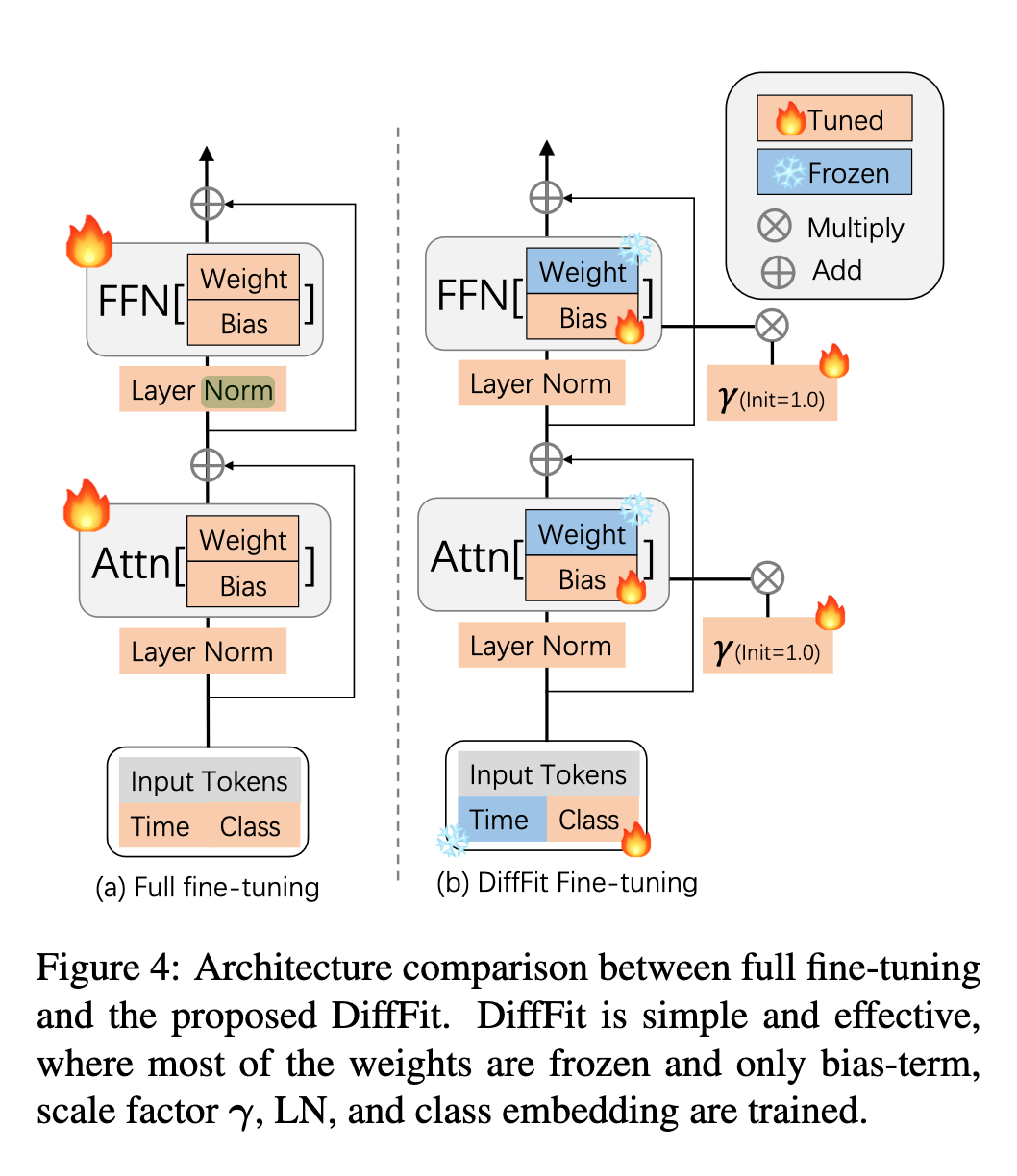An implementation of DiffFit: Unlocking Transferability of Large Diffusion Models via Simple Parameter-Efficient Fine-Tuning by using d🧨ffusers.
My summary tweet is found here.
DiffFit is an extension of an existing PEFT called BitFit: Simple Parameter-efficient Fine-tuning for Transformer-based Masked Language-models where only the bias-terms of the model are trainable. In addition to bias-terms, learnable scaling factors to each transformer block and LN are trained for better adaption.
In the paper, they applied DiffFit to DiT instead of UNet-based DMs but mentioned DiffFit can be generalized to other DMs e.g. text-to-image models like Stable Diffusion. So, in this repo, I extended it for Stable Diffusion in domain-tuning setting.
- Add scale factors in transformer-blocks and attention blocks including cross-attention
- Adapt DiffFit to text encoder
- Introduce the strategy (identifier token, prior preservation) of Dreambooth
Also, you can try BitFit: Simple Parameter-efficient Fine-tuning for Transformer-based Masked Language-models here.
$ git clone https://github.com/mkshing/DiffFit-pytorch.git
$ pip install -r requirements.txtexport MODEL_NAME="CompVis/stable-diffusion-v1-4"
export INSTANCE_DIR="path-to-instance-images"
export CLASS_DIR="path-to-class-images"
export OUTPUT_DIR="path-to-save-model"
accelerate launch train_difffit.py \
--pretrained_model_name_or_path=$MODEL_NAME \
--instance_data_dir=$INSTANCE_DIR \
--class_data_dir=$CLASS_DIR \
--output_dir=$OUTPUT_DIR \
--instance_prompt="a photo of sks dog" \
--resolution=512 \
--train_batch_size=1 \
--gradient_accumulation_steps=1 \
--gradient_checkpointing \
--use_8bit_adam \
--learning_rate=1e-3 \
--add_vlb_loss \
--vlb_lambda=0.001 \
--lr_scheduler="constant" \
--lr_warmup_steps=0 \
--num_class_images=200 \
--max_train_steps=500 \
# you can add prior preservation loss
# --class_prompt="a photo of dog" \
# --with_prior_preservation --prior_loss_weight=1.0 \
# optionally add extra params in text encoder
# --train_text_encoder \Add --bitfit for BitFit.
import torch
from diffusers import DiffusionPipeline, DPMSolverMultistepScheduler
from difffit_pytorch import load_unet_for_difffit, load_text_encoder_for_difffit, load_config_for_difffit
pretrained_model_name_or_path = "runwayml/stable-diffusion-v1-5"
efficient_weights_ckpt = "ckpt-dir-path"
training_args = load_config_for_difffit(args.efficient_weights_ckpt)
unet = load_unet_for_difffit(args.pretrained_model_name_or_path, efficient_weights_ckpt=args.efficient_weights_ckpt, is_bitfit=training_args["bitfit"], subfolder="unet")
text_encoder = load_text_encoder_for_difffit(args.pretrained_model_name_or_path, efficient_weights_ckpt=args.efficient_weights_ckpt, is_bitfit=training_args["bitfit"], subfolder="text_encoder")
# load pipe
pipe = StableDiffusionPipeline.from_pretrained(
pretrained_model_name_or_path,
unet=unet,
text_encoder=text_encoder,
)
pipe.scheduler = DPMSolverMultistepScheduler.from_config(pipe.scheduler.config)
pipe.to("cuda")
image = pipe("A picture of a sks dog in a bucket", num_inference_steps=25).images[0]